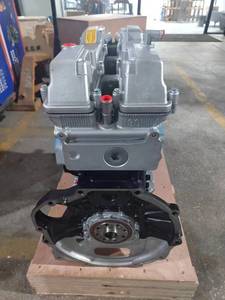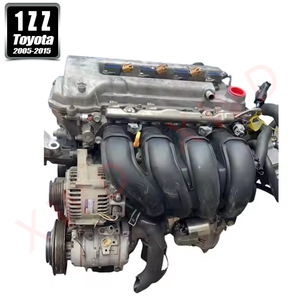(1635 products available)




















































































































































































The 1JZ engine is a straight-six piston engine that was manufactured by Toyota. It is also called the 1JZ-GE. The 1JZ engine was first launched in 1989. It is a naturally aspirated engine with a 2.5-liter displacement. The 1JZ engine was used in many Toyota vehicles up to 2007. The 1JZ engine has different variants. They include the following:
The 1JZ-GTE is a 2.5 L, inline-six-cylinder, dual overhead camshaft (DOHC) engine with 24 valves and a turbocharged engine. The 1JZ-GTE was introduced in 1989. The original 1JZ engine was used in Toyota's mid-size cars, such as the Toyota Chaser, Toyota Mark II, and Toyota Cresta.
Chaser 1jz engines are high-performance engines that require regular maintenance to ensure optimal performance and longevity. Here are some general maintenance tips for the 1JZ engine:
Regular oil changes
Engine oil lubricates internal components and reduces friction. It is essential to change the engine oil and oil filter every 5,000 kilometers or every three months. This helps to remove impurities and ensure proper lubrication.
Air filter replacement
The air filter should be checked every 10,000 kilometers and replaced if necessary. A clean air filter ensures optimal combustion and prevents engine wear.
Coolant flush
The cooling system should be flushed and cleaned every 40,000 kilometers or every two years. This removes corrosion and ensures efficient heat dissipation. The coolant and thermostat should also be replaced to maintain optimal engine temperature.
Spark plug inspection
Spark plugs should be checked every 20,000 kilometers for wear and replaced every 40,000 kilometers. They play a crucial role in ignition and combustion. Worn spark plugs can cause misfires and reduced engine efficiency.
Regular valve clearance adjustment
Valve clearances should be checked and adjusted as per the manufacturer's specifications. This ensures optimal engine performance and reduces emissions.
Fuel system cleaning
The fuel system, including fuel injectors and the fuel filter, should be cleaned every 30,000 kilometers. A clean fuel system ensures optimal combustion and improves fuel efficiency.
Regular timing belt replacement
The timing belt should be replaced every 100,000 kilometers or per the manufacturer's recommendations. A worn timing belt can cause engine damage.
Regular inspection and maintenance
Other engine components, such as the alternator, starter motor, and accessories, should be inspected regularly. Any worn or damaged parts should be replaced immediately to prevent engine damage.
Choosing a suitable 1JZ engine for one’s needs can be a challenging task. Here are some factors to consider when selecting a 1JZ engine:
Replacing an old 1jz engine requires sufficient mechanical knowledge and expertise. Follow the steps below for a successful DIY project:
Prepare the work area
Set up a well-ventilated and spacious work area, and gather all necessary tools, including engine hoist, jack stands, sockets, wrenches, and safety gear. Disconnect the battery and drain the engine oil and coolant.
Lift the vehicle
Use a jack to raise the vehicle and secure it with jack stands. This provides enough room for working under the car and removing the old engine.
Remove the old engine
First, remove all accessories connected to the old engine, such as the air intake, exhaust manifold, wiring, cooling system, and others. Then, unbolt the engine from the transmission and place it on an engine hoist. Carefully lift the engine out of the bay and place it on a stable work surface.
Prepare the new engine
Before installing the new 1jz engine, ensure it is clean and all components are properly lubricated. Then, install all accessories onto the new engine, such as the alternator, starter motor, power steering pump, and others.
Install the new engine
Lower the new engine onto the vehicle using the engine hoist. Then, connect the engine to the transmission and install all wiring, cooling, and exhaust systems. Refill engine oil and coolant.
Final checks
Before starting the engine, double-check all connections and ensure there are no leaks. Once the double-checking is done, start the engine and allow it to run for a few minutes. Then, check for any unusual noises or vibrations and address them accordingly.
Q1: What is the most common problem with the 1JZ engine?
A1: The 1JZ engines have their fair share of problems. The 1JZ VVTi overheating issue is a major concern. When this engine runs hot, it can cause serious damage if not addressed in time. Another problem with the 1JZ VVTi engine is the oil leak. The leaks are mostly caused by worn-out gaskets. The 1JZ GTE also has piston slap issues, which is a noise caused by loose pistons in the cylinder.
Q2: How long does the 1JZ engine last?
A2: Engine 1Jz longevity depends on various factors like maintenance, driving habits, and load. However, with proper maintenance, the 1JZ engine can give users up to 300,000 kilometers or more. The key to prolonging the lifespan of the 1JZ engine is to ensure it receives regular maintenance and service.
Q3: Is the 1JZ engine good for performance?
A3: The 1JZ engine is a good choice for anyone looking for an engine that delivers adequate power and performance. The 1JZ engine generates decent power for its size, making it suitable for most applications. However, the 1JZ engine is not as powerful as the 2JZ engine, which is another product of the Toyota Motor Corporation.
Q4: Is the 1JZ engine still in use?
A4: The 1JZ engine was discontinued in 2019. However, there are still a number of vehicles on the road that are powered by this engine. The 1JZ engine is a popular engine swap choice for many tuners and car enthusiasts because of its potential for performance gains.
The keyword "engine 1jz" exhibits a consistent average monthly web search volume of 3600, with a notable decline of 19% over the past year. Despite this year-long trend, the three-month change shows zero percent fluctuation, indicating a stable interest in recent months.
Analyzing the monthly data from November 2023 to July 2024, the web search volume for "engine 1jz" remained steady at 3600 web searches per month. However, a decrease became apparent starting in August 2024, where the web search volume dropped to 2900 and maintained this lower level through October 2024. This pattern suggests a seasonal variation, with peaks in the early months and a noticeable dip towards the end of the year.
The stability in web search volume from November 2023 to July 2024 implies a solid, ongoing interest in the engine 1jz, possibly driven by car enthusiasts and mechanics seeking information about this specific vehicle component. The drop in web searches from August 2024 could be indicative of a shift in consumer focus or seasonal market adjustments, but without further context, the exact cause remains speculative. This analysis underscores the importance of monitoring search trends to understand shifts in consumer interest or market dynamics.